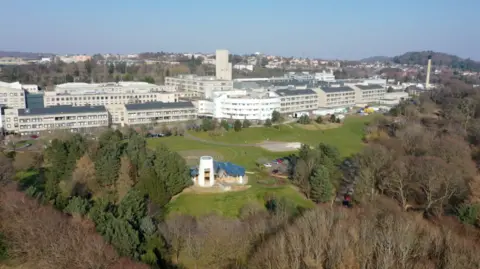Patient safety concerns found at maternity unit
 Getty Images
Getty ImagesStaffing shortages and delays in assessing expectant mums are among a series of patient safety concerns found with maternity services at Dundee's Ninewells Hospital.
The concerns were identified during the first of a new programme of unannounced inspections of maternity units by Healthcare Improvement Scotland (HIS).
The safety watchdog, which also praised frontline staff for their compassionate care, made 20 requirements for improvement at Ninewells.
NHS Tayside said it had taken on board all of the recommendations and developed action plans to address them.
There have not been any routine inspections of maternity units in Scotland until now, although they have been included in wider hospital inspections or been subject to specific assessments.
The introduction of routine, unannounced inspections was one of the key recommendations of an independent review that followed a spike in the deaths of newborn babies.
The Ninewells inspection took place in January but inspectors made an unscheduled second visit the following month because of the immediacy of their concerns. The inspectors found:
- Delays within the maternity triage department and a variation in how women were assessed by staff
- Staff unsure of both the location of the emergency medication for birthing and the process for accessing it
- Delays to the induction of labour process of up to 72 hours for some patients
- Equipment missing leads meaning only three of five fetal heartbeat monitors were in full working order across the unit's five labour rooms
- A 33% shortfall in the number of more experienced midwifes required with evidence that newly qualified midwives were stepping in to fill this gap

Elsewhere in the HIS inspection report it was revealed that staff training was under pressure due to the maternity unit's workload and high levels of sick leave.
Inspectors also found a disconnect between staff and senior managers regarding staffing and patient safety issues, with some workers telling them it was "challenging to always maintain patient safety when [the] skill mix within the team was not optimal".
The maternity services inspection for Ninewells resulted in nine areas of good practice being identified, three recommendations and 20 requirements.
'Immediate improvement' required
Donna Maclean, chief inspector at HIS, said: "During our inspection of the maternity services we saw staff providing compassionate and responsive care to women and their families and women we spoke with were complimentary of the care provided.
"However, as a result of concerns identified during our inspection, that required immediate improvement, we carried out an unannounced revisit.
"The concerns related to variation in practice to assessing women within maternity triage and to staff access and awareness of retrieval of emergency medication within the maternity triage department."
She added: "Other areas for improvement include assurance of safe staffing, fire safety issues and the maintenance of the hospital environment."
Maternity units in England are already inspected by an independent watchdog and in 2023 it was found that two thirds were not safe enough.
'Positive, good practice'
NHS Tayside's Executive Nurse Director, Simon Dunn, said the report highlighted areas of "positive, good practice" and standards of care which patients and their families have recognised as "extremely positive".
He added: "We will always embrace the opportunity to participate in improvement initiatives and receive feedback on the standards of care we deliver.
"Our clinical teams have taken on board all of the recommendations and developed action plans to address these.
"Safe standards of care are at the heart of everything we do and therefore we have ensured our action plans keep our patients at the centre of our improvement work."
